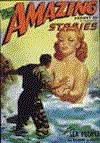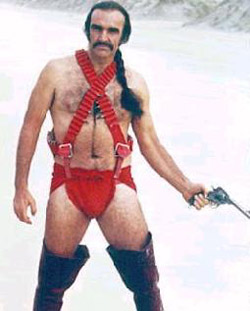|
|
|
'70s sci-fi gets socially conscious April 12, 2001 By Franklin Harris With "2001: A Space Odyssey," director Stanley Kubrick made science fiction respectable. Sure, there were good, serious SF films before it. "Forbidden Planet" and "The Day the Earth Stood Still" come to mind. But Kubrick showed SF movies could be artistic. It was inevitable that those following Kubrick would try to make SF movies political, too, and they did so with varying degrees of success. Ranking as the most artistically bankrupt and morally reprehensible example is "Silent Running" (1971). This ecological fable stars Bruce Dern as Freeman Lowell, just one of Dern's many cinematic psychos. The difference is that "Silent Running," unlike Dern's other efforts, pretends Dern's character is the hero, when actually he is a murdering nutcase who cares more for the lives of trees than the lives of people. He is the forerunner of today's Earth First! activist. In the future, Earth's last surviving forest is, for reasons no scientist could fathom, inside a domed spaceship orbiting Saturn. When the government orders the forest's destruction, because -- well, just because -- Lowell turns eco-warrior. To protect the forest, he kills his fellow astronauts and, ultimately, himself. Lowell leaves the forest in the care of one of his robot companions. But without humans around, where will the trees get the CO2 they need to live? Oh, well. And as if the movie itself isn't insulting enough, the songs by '60s folk singer Joan Baez will introduce you, and especially your household pets, to new depths of pain. Never mind the trees, what about animal cruelty? Dog ears are sensitive, you know. Ironically, the grand poobah of '70s socially conscious sci-fi is Hollywood's only surviving conservative not in captivity, Charlton Heston. Heston stars in two of the classics of the era, "The Omega Man" (1971) and "Soylent Green" (1973), not to mention "Planet of the Apes," which came out the same year as "2001." "Soylent Green" is the decade's most apocalyptic statement on the dangers of overpopulation. It gives us a future so bleak that people have unwittingly resorted to cannibalism to survive. In retrospect, "Soylent Green" is just another scare movie that failed miserably as prophecy. (O.K., it isn't 2022 yet, but check back in 21 years, and I'll bet I'm still eating hamburgers, foot-and-mouth disease or no.) But at least "Soylent Green" gives Chuck an opportunity to utter one of the cinema's most enduring lines: "Soylent Green is people!" Hmm. Maybe it's how he says it. The one movie that actually seems more relevant today than when it came out is "Logan's Run" (1976). In that future, youth is everything. If you are 30 years old, you're over the hill, and your options are to submit to euthanasia, in hopes of being "renewed," or to run, and risk being hunted down by the Sandmen. Michael York stars as Logan, a Sandman who winds up one of the hunted when his own time runs out. If anything, America is more obsessed with youth today than ever. I submit the success of Brittany Spears as proof enough. Unsurprisingly, a remake of "Logan's Run" is in development, and word is that this time it will be more faithful to the original novel. In the novel, the Sandmen track you down at 20, not 30. The most ambitious film of the lot is probably "Zardoz" (1974). Directed by John Boorman ("Excalibur"), "Zardoz" stars Sean Connery, who, as Boorman says on the just-released DVD's charming commentary track, was desperate to shake James Bond typecasting.
As Boorman admits in his commentary, there are too many ideas in his mad, psychedelic film. There are overlapping themes, mostly about class relationships and sex. It's also a twisted retelling of "The Wizard of Oz." But ultimately "Zardoz" is just about how the certainty of death is the only thing that makes life worth living, because otherwise life is a bore. Agree with Boorman or not, it's hard not to like a director who tells you when to fast forward through the boring bits. |

RECENT COLUMNS
Order a helping of Cartoon Network's 'Robot Chicken'
03/31/05
Campaign against video games is political grandstanding
03/24/05
Prize-winning author is 'Wrong About Japan'
03/17/05
Censored book not a good start
03/10/05
Some superhero comics are for 'fanboys' only
03/03/05
'Constantine' does well with its out-of-place hero
02/24/05
'80s publisher First Comics' legacy still felt
02/17/05
Director's cut gives new 'Daredevil' DVD an edge
02/10/05
Put the fun back into 'funnybooks'
02/04/05
Is 'Elektra' the end of the road for Marvel movies?
01/27/05
'House of Flying Daggers' combines martial arts and heart
01/20/05
Anniversary edition of 'Flying Guillotine' has the chops
01/13/05
Movie books still have role in the Internet era
01/06/05
Looking ahead to the good and the bad for 2005
12/30/04
The best and worst of 2004
12/23/04
'Has-been' Shatner is a 'transformed man'
12/16/04
© Copyright 2005 PULP CULTURE PRODUCTIONS
Web site designed by Franklin Harris.
Send feedback to franklin@pulpculture.net.
